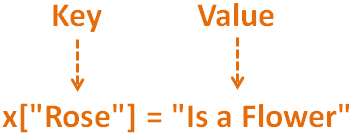

Let us say, we have a Hash that contains,
As Key and Value pair.
Now, let us say, we want to insert a new entry,
Rose, Is a Flower
Where Rose is the Key and Is a Flower is its corresponding Value.
This can be achieved by two ways:
Let us see in the below example using the first way.
x = {
5 => "Is a Number",
"John" => "Is a Name",
"Ruby" => "Is a Language"
}
x["Rose"] = "Is a Flower"
puts x
So, in the above code we have created a Hash using braces {} and Key and Value pairs.
x = {
5 => "Is a Number",
"John" => "Is a Name",
"Ruby" => "Is a Language"
}And initialised to the variable x.

Now, we are supposed to add a new entry to the Hash. Where the Key would be Rose and the Value Is a Flower.
So, we have used the below way to add it.
x["Rose"] = "Is a Flower"

And the entry is added to the Hash.

And we get the below output,
{5=>"Is a Number", "John"=>"Is a Name", "Ruby"=>"Is a Language", "Rose"=>"Is a Flower"}Let us see the second way of adding a Key Value using the update() Method.
x = {
5 => "Is a Number",
"John" => "Is a Name",
"Ruby" => "Is a Language"
}
x.update({"Rose"#{x}Is a Flower"})
puts x
So, in the above code we have created a Hash using braces {} and Key and Value pairs.
x = {
5 => "Is a Number",
"John" => "Is a Name",
"Ruby" => "Is a Language"
}And initialised to the variable x.

Now, we are supposed to add a new entry to the Hash. Where the Key would be Rose and the Value Is a Flower.
So, we have used the update() Method to add it.
x.update({"Rose"#{x}Is a Flower"})And the entry is added to the Hash.

And we get the below output,
Let us say, we have a Hash that contains,
As Key and Value pair.
Now, let us say, we want to insert a new entry,
John, Is an English Name
Where John is the Key and Is an English Name is its corresponding Value.
Let us see in the below example.
x = {
5 => "Is a Number",
"John" => "Is a Name",
"Ruby" => "Is a Language"
}
x["John"] = "Is an English Name"
puts x
So, for the Key, John the initial value was Is a Name.
x = {
5 => "Is a Number",
"John" => "Is a Name",
"Ruby" => "Is a Language"
}And we wanted to add a new entry with the Key as John and the Value as Is an English Name.
x["John"] = "Is an English Name"
But if we see the output.
We can see the Key, John is updated with the Value, Is an English Name.
That's because duplicate Keys are not allowed in Hash. The corresponding value for that Key will get updated with the new Value.